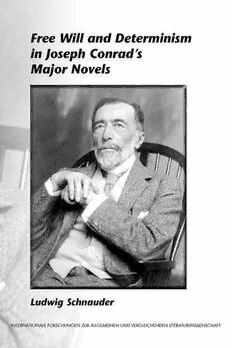
Free Will and Determinism in Joseph Conrad's Major Novels. (Internationale Forschungen Zur Allgemeinen & Vergleichenden Literaturwissenschaft) PDF
269 Pages·2009·1.968 MB·English
Most books are stored in the elastic cloud where traffic is expensive. For this reason, we have a limit on daily download.
Preview Free Will and Determinism in Joseph Conrad's Major Novels. (Internationale Forschungen Zur Allgemeinen & Vergleichenden Literaturwissenschaft)
Description:
Although it has often been pointed out that the protagonists of Joseph Conrad's novels frequently fail in what they attempt to achieve, the forces that oppose them have rarely been examined systematically. Furthermore, no sustained attempts have been made to rigorously address the central philosophical issue the characters' predicament raises: that of the freedom-of-the-will. This interdisciplinary study seeks to remedy this neglect by taking recourse not only to the philosophical debate about free will and determinism but also to the relevant historical, economic, scientific, and literary discourses in the Victorian and Early-Modernist periods. Against this background a paradigmatic analysis of three of Conrad's most significant novels - Heart of Darkness, Nostromo, and The Secret Agent - investigates the writer's position in the free will and determinism debate by identifying certain recurring themes in which the freedom-of-the-will problem manifests itself. Light is thereby also thrown on a central Conradian paradox: how Conrad can insist on morality and moral responsibility, which presupposes the existence of free will, in a materialist-deterministic world, which denies it.
See more
The list of books you might like
Most books are stored in the elastic cloud where traffic is expensive. For this reason, we have a limit on daily download.
